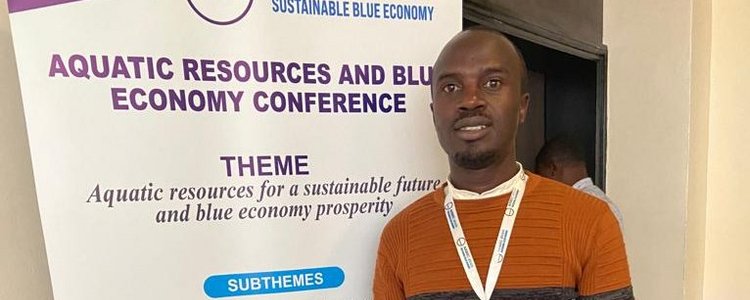The AQUATIC RESOURCES AND BLUE ECONOMY CONFERENCE (ARBEC) 2022 was held in Kisumu, Kenya between 28 November to 1 December 2022. The conference was hosted by Kenya Marine and Fisheries Research Institute (KMFRI) in collaboration with African Centre for Aquatic Research and Education (ACARE), Lake Victoria Fisheries Organization (LVFO), Gatsby Africa, Bowling Green State University (BGSU) and the Great Lakes Institute for Environmental Research (GLIER). The theme of the conference was “Aquatic resources for a sustainable future and blue economy prosperity”. The conference's deliberations were a step towards achieving the United Nations Sustainable Development Goals (SDGs), such as SDG2 and SDG14: zero hunger and life under water respectively.
It was a great experience and exposure for me to have participated and presented my manuscript in such a forum of interchange with many research professionals, farmers and PhD students through virtual and in person presentations. My Presentation was titled “Introgressive hybridization levels of Tilapiines species in Lake Victoria basin, Kenya inferred from microsatellite and mitochondrial DNA genotyping based on next- generation sequencing”. Constructive feedback from the fellow presenters was received especially on the implications of my study towards Tilapia species conservation. The manuscript presented was motivated by the fact that the genetic integrity of tilapiines has been compromised through competition, predation, hybridization, and introgression. Thus there is a need to clearly understand the levels of hybridization using genetic tools: microsatellite and mitochondrial DNA (mtDNA) genetic using next-generation sequencing. The results indicate low levels of hybridization from Oreochromis niloticus into other Oreochromis species. The results contribute to the need for conservation measures of these fish species.
Gerald Kwikiriza is a PhD candidate at the Institute for Integrative Nature Conservation Research, Department of Integrative Biology and Biodiversity Research (DIB) University of Natural Resources and Life Sciences, since 2022. Gerald’s research project focuses on “Understanding the Ecological and Genetic impacts of aquaculture on native tilapiines in Lake systems of Uganda”. Prior to joining the University of Natural Resources and Life Sciences in 2022, Gerald worked at the Department of Zoology, Entomology & Fisheries Sciences, Makerere University as a research assistant. Gerald has an International Joint Masters Degree of Limnology and Wetland Management obtained from the University of Natural Resources and Life Sciences, Vienna (Austria), Egerton University (Kenya) and IHE Institute for Water Education, Delft (The Netherlands).
APPEAR scholar Gerald Kwikiriza presents at the Aquatic Resources and Blue Economy Conference 2022
The conference brought together researchers, innovators, academia, entrepreneurs and other stakeholders from around the world to share their experiences and lessons learned about how to use aquatic resources wisely for human sustenance, prosperity and the blue economy connection.
